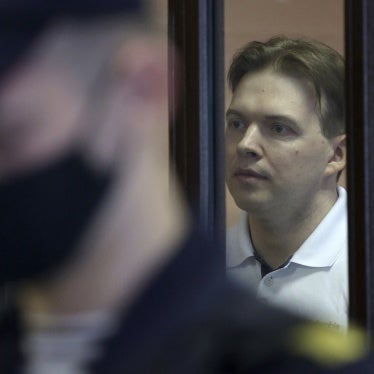On September 30, Lithuania asked the International Criminal Court (ICC) prosecutor to investigate serious crimes committed by the Belarusian authorities against its citizens. Following years of brutal crackdowns on civil society, journalists, and opposition politicians, Lithuania's initiative should encourage stronger efforts to advance accountability and justice for all Belarusians.
In 2020, mass peaceful protests erupted across Belarus in response to Aliaksandr Lukashenka’s gross manipulation of the August 2020 presidential vote. The government responded with a vicious crackdown, during which Belarusian law enforcement arbitrarily detained thousands of people and systematically subjected hundreds to torture and other ill-treatment. The repression continues to this day. Over the next four years, authorities conducted smear campaigns and prosecutions against activists, independent journalists, and human rights defenders on trumped-up, politically motivated charges, including against critics living abroad. Authorities have also sought to restrict freedom of expression and association, including by using systematic and widespread retaliation against lawyers representing clients in politically motivated cases.
The United Nations Special Rapporteur on the human rights situation of Belarus and rights groups have highlighted that Belarusian nationals were being forced to flee their country because of the crackdown and systematic abuses. According to the UN Office of the High Commissioner for Human Rights, some of these appalling human rights violations may amount to crimes against humanity because of “their intentionally directed, widespread and systematic nature against the civilian population,” and in April this year a special investigative body was set up to probe further.
Lithuania, an ICC member country, alleges that since 2020, “crimes against humanity – including deportation, persecution and other inhumane acts – have been carried out against the civilian population of Belarus.” Lithuania argues the court has jurisdiction to investigate the alleged crimes, despite Belarus not being an ICC member, because some elements of the crimes took place on Lithuania territory. The ICC prosecutor is now conducting a preliminary examination that may lead to the opening of a formal investigation.
Civil society organizations have also set up the International Accountability Platform for Belarus to collect evidence of human rights crimes for future prosecutions. Complaints have been filed under the principle of universal jurisdiction in some European countries, including Germany and Poland. So far, only Lithuanian judicial authorities have an open criminal investigation related to these abuses.
For years Belarusian authorities have persecuted and oppressed Belarusians in a climate of impunity. Hopefully, these efforts start a journey towards accountability and justice for the many victims of Lukashenka’s government.








